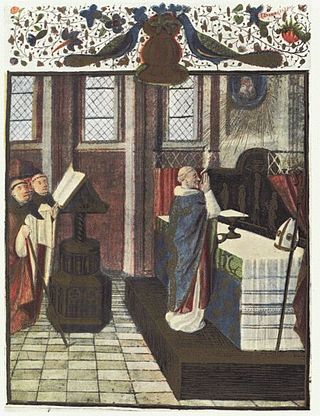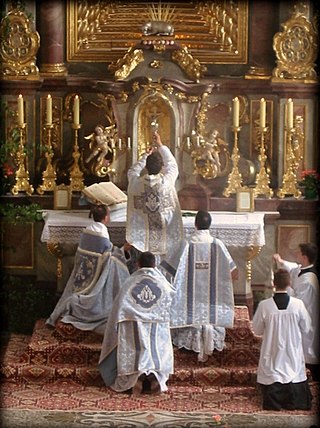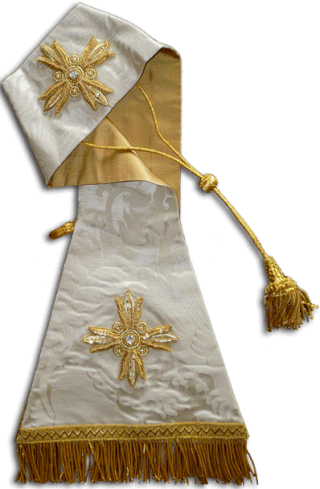Latin Mass may refer to:

Mass is the main Eucharistic liturgical service in many forms of Western Christianity. The term Mass is commonly used in the Catholic Church, Western Rite Orthodoxy, Old Catholicism, and Independent Catholicism. The term is also used in some Lutheran churches, as well as in some Anglican churches, and on rare occasion by other Protestant churches.

The Mass of Paul VI, also known as the Ordinary Form or Novus Ordo, is currently the most commonly used liturgy in the Catholic Church. It was promulgated by Pope Paul VI in 1969 and its liturgical books were published in 1970; those books were then revised in 1975, they were revised again by Pope John Paul II in 2000, and a third revision was published in 2002.

The Tridentine Mass, also known as the Traditional Latin Mass or the Traditional Rite, is the liturgy in the Roman Missal of the Catholic Church published from 1570 to 1962. Celebrated almost exclusively in Ecclesiastical Latin, it was the most widely used Eucharistic liturgy in the world from its issuance in 1570 until the introduction of the Mass of Paul VI.

A Pontifical High Mass, also called Solemn Pontifical Mass, is a Solemn or High Mass celebrated by a bishop using certain prescribed ceremonies. Although in modern English the word "pontifical" is almost exclusively associated with the pope, any bishop may be properly called a pontiff. Thus, the celebrant of a Pontifical High Mass may be the pope, any bishop or any other prelate who is allowed to wear pontificals.

The maniple is a liturgical vestment used primarily within the Catholic Church, and occasionally used by some Anglo-Catholic and Lutheran clergy. It is an embroidered band of silk or similar fabric that is hung over the left arm. It is only used within the context of the Mass, and it is of the same liturgical colour as the other Mass vestments.
Quattuor abhinc annos is the incipit of a letter that the Congregation for Divine Worship and the Discipline of the Sacraments sent on 3 October 1984 to presidents of episcopal conferences concerning celebration of Mass in the Tridentine form.

The Latin Mass Society of England and Wales is a Catholic society dedicated to making the Extraordinary Form of the Roman Rite, also known as the Tridentine Mass, more widely available in England and Wales. The group organised a petition for the Latin Mass in England and Wales which the Archbishop of Westminster, Cardinal John Heenan, presented to Pope Paul VI, who granted a papal indult in 1971.

The Roman Rite is the most common ritual family for performing the ecclesiastical services of the Latin Church, the largest of the sui iuris particular churches that comprise the Catholic Church. The Roman Rite governs rites such as the Roman Mass and the Liturgy of the Hours as well as the manner in which sacraments and blessings are performed.

Pre-Tridentine Mass refers to the variants of the liturgical rite of Mass in the West before 1570, when, with his bull Quo primum, Pope Pius V made the Roman Missal, as revised by him, obligatory throughout the Latin Church, except for those places and congregations whose distinct rites could demonstrate an antiquity of two hundred years or more.

Latin liturgical rites, or Western liturgical rites, is a large family of liturgical rites and uses of public worship employed by the Latin Church, the largest particular church sui iuris of the Catholic Church, that originated in Europe where the Latin language once dominated. Its language is now known as Ecclesiastical Latin. The most used rite is the Roman Rite.

Ite, missa est are the concluding Latin words addressed to the people in the Mass of the Roman Rite in the Catholic Church, as well as in the Divine Service of the Lutheran Church.

The Mass is the central liturgical service of the Eucharist in the Catholic Church, in which bread and wine are consecrated and become the body and blood of Christ. As defined by the Church at the Council of Trent, in the Mass "the same Christ who offered himself once in a bloody manner on the altar of the cross, is present and offered in an unbloody manner". The Church describes the Mass as the "source and summit of the Christian life", and teaches that the Mass is a sacrifice, in which the sacramental bread and wine, through consecration by an ordained priest, become the sacrificial body, blood, soul, and divinity of Christ as the sacrifice on Calvary made truly present once again on the altar. The Catholic Church permits only baptised members in the state of grace to receive Christ in the Eucharist.
Summorum Pontificum is an apostolic letter of Pope Benedict XVI, issued in July 2007. This letter specifies the circumstances in which priests of the Latin Church could celebrate Mass according to what Benedict XVI called the "Missal promulgated by Blessed John XXIII in 1962" and administer most of the sacraments in the form used before the liturgical reforms that followed the Second Vatican Council.

The liturgical books of the Roman Rite are the official books containing the words to be recited and the actions to be performed in the celebration of Catholic liturgy as done in Rome. The Roman Rite of the Latin or Western Church of the Catholic Church is the most widely celebrated of the scores of Catholic liturgical rites. The titles of some of these books contain the adjective "Roman", e.g. the "Roman Missal", to distinguish them from the liturgical books for the other rites of the Church.
Order of Mass is an outline of a Mass celebration, describing how and in what order liturgical texts and rituals are employed to constitute a Mass.
Latin Rite may refer to:
Traditionis custodes is an apostolic letter issued motu proprio by Pope Francis, promulgated on 16 July 2021 regarding the continued use of pre-Vatican II rites. It restricts the celebration of the Tridentine Mass of the Roman Rite, sometimes colloquially called the "Latin Mass" or the "Traditional Latin Mass". The apostolic letter was accompanied by an ecclesiastical letter to the Catholic bishops of the world.
Liturgical use of Latin is the practice of performing Christian liturgy in Ecclesiastical Latin, typically in the liturgical rites of the Latin Church.

In the Catholic Church, preconciliar Latin liturgical rites coexist with postconciliar rites. In the years following the Second Vatican Council, Pope Paul VI initiated significant changes. Some of Paul VI's contemporaries, who considered the changes to be too drastic, obtained from him limited permission for the continued use of the previous Roman Missal. In the years since, the Holy See has granted varying degrees of permission to celebrate the Roman Rite and other Latin rites in the same manner as before the council. The use of preconciliar rites is associated with traditionalist Catholicism.
Catholic liturgy can refer to the various Christian liturgies of the Catholic Church. It may also refer to various particular liturgies and liturgical rites: